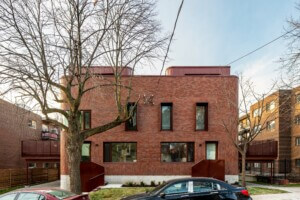While the relentless narcissism of tech leaders is skewered in shows like HBO’s Silicon Valley, the most popular digital tools are designed to help individuals understand more about the world and foster social interaction.
One panel at the New Cities Summit discussed how (or if) technology can be used to create more inclusive cites by reimagining citizen engagement with pressing, divisive social issues like the redistributing the means of production, shared resources, housing shortages, and migration.
The discussion, moderated by the International Council of Societies of Industrial Design‘s Dilki de Silva, brought together Jenviev Azzolin, president and cofounder of PPLCONNECT and WeHost; Josh Lerner, cofounder and executive director of the New York–based Participatory Budgeting Project (PBP); Steven Ramage, strategy director of What3words; and Asif Saleh, senior director of strategy, communication, and empowerment at BRAC International (“one of the largest NGOs you have never heard of”).
Lerner’s organization, the PBP, encourages citizens, especially marginalized residents, to participate in local democracy: “Participatory budgeting adds concrete outcomes to participation,” he explained. “If you come out, you can decide how to spend a million dollars in your neighborhood.” Meetings are held in churches or community centers, and residents decide if funds will be spent on parks, schools, or city streets. Budget delegates take ideas and bring them to applicable city agencies, who then return with an actionable plan that the community votes on. Annual process, reaches people who are not online by texting information to participants. The video below gives an overview of the process and outcomes:
For all the dopamine-boosting allure of smartphones, some of the best tech for community engagement is, Lerner quipped, “something you may have heard of: Pen and paper.” It’s the most cost-effective tool for engagement, especially for individuals who may have limited access to computers and wifi. The PBP also has a text-messaging service to keep participants abreast of meetings and project updates.
Building on the old-school thread, Ramage noted that Future City Glasgow did a pen-and-paper participatory mapping project and found, to the organizers’ surprise, that some lower-income citizens wouldn’t go into city center because they saw it as so different from where they lived.
With Britain set to vote on a Brexit tomorrow, the conversation dove into how to serve under-resourced migrants to urban areas. In many developing countries, Saleh elaborated, migrants move to cities seasonally. While there, they work for 12 or more hours per day. Governments are reluctant to provide services to this transient-but-fixed population in cities like Dhaka, Bangladesh where BRAC is based.
Consequently, it’s difficult to organize and build community in these groups. BRAC started bKash, a mobile financial service, three years ago that lets migrants to send money home through their phones. Over 95 percent of Banglidashis have cell phones, but only 20 percent have a formal bank account. bKash, said Saleh, is “enormously popular, like a wildfire”: With 20 million subscribers, it’s set to become second largest mobile financial services company in the world (behind Kenya’s mPesa). To Saleh, mobile banking gives poor people more liquidity, more freedoms, and thus more power to organize.
Jenviev Azzolin’s WeHost engages migrants on the her homefront. The Canadian service is an “Airbnb for refugees” that lets Canadian citizens host government-sponsored refugees in their homes. “WeHost empowers anyone to take action by signing up,” Azzolin enthused, noting that a number of Canadians have written to her to say “thank you, it feels like I’m doing something about the refugee crisis.”
So far, 1,000 hosts have accepted some of the 25,000 refugees that have migrated to Canada. Families comprise the majority of participants, and are vetted by WeHost and oriented by a 60-person volunteer network before accepting guests.










